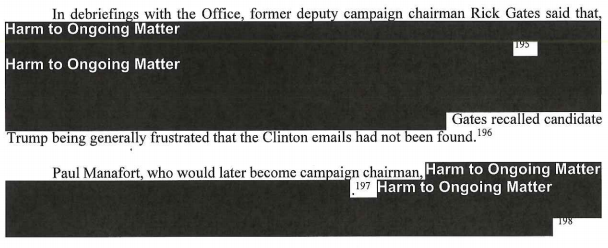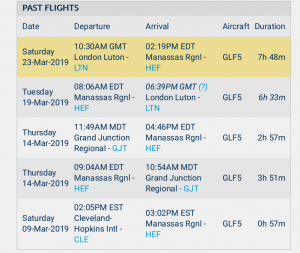In the Barr Memo usurping Congress’ role in determining whether the evidence presented in the Mueller Report amounts to obstruction, he based a lot of his judgment finding no obstruction on the fact that Mueller “did not establish” that Trump and his campaign conspired with Russia.
In making this determination, we noted that the Special Counsel recognized that “the evidence does not establish that the President was involved in an underlying crime related to Russian election interference,” and that, while not determinative, the absence of such evidence bears upon the President’s intent with respect to obstruction.
The line is unbelievably cynical for several reasons. First, right at the beginning of the report, Mueller points out that his use of “did not establish” does not mean “there was no evidence.”
A statement that the investigation did not establish particular facts does not mean there was no evidence of those facts.
Yet in spite of that warning, Barr nevertheless claims that Mueller’s observation that he did not establish Trump’s involvement in a crime related the Russia’s election interference amounts to an “absence of such evidence.”
Moreover, Barr takes that quote out of the context of Mueller’s discussions about the corrupt motives that Trump might have to obstruct the investigation. (I’ve bolded the actual sentence Barr quotes, but included both of Mueller’s discussions of Trump’s implication in potential crimes.)
In addition, the President had a motive to put the FBI’s Russia investigation behind him. The evidence does not establish that the termination of Comey was designed to cover up a conspiracy between the Trump Campaign and Russia: As described in Volume I, the evidence uncovered in the investigation did not establish that the President or those close to him were involved in the charged Russian computer-hacking or active-measure conspiracies, or that the President otherwise had an unlawful relationship with any Russian official. But the evidence does indicate that a thorough FBI investigation would uncover facts about the campaign and the President personally that the President could have understood to be crimes or that would give rise to personal and political concerns. Although the President publicly stated during and after the election that he had no connection to Russia, the Trump Organization, through Michael Cohen, was pursuing the proposed Trump Tower Moscow project through June 2016 and candidate Trump was repeatedly briefed on the progress of those efforts.498 In addition, some witnesses said that Trump was aware that [redacted] at a time when public reports stated that Russian intelligence officials were behind the hacks, and that Trump privately sought information about future WikiLeaks releases.499 More broadly, multiple witnesses described the President’s preoccupation with press coverage of the Russia investigation and his persistent concern that it raised questions about the legitimacy of his election.500
[snip]
Second, many obstruction cases involve the attempted or actual cover-up of an underlying crime. Personal criminal conduct can furnish strong evidence that the individual had an improper obstructive purpose, see, e.g. , United States v. Willoughby, 860 F.2d 15, 24 (2d Cir. 1988), or that he contemplated an effect on an official proceeding, see, e.g., United States v. Binday, 804 F.3d 558, 591 (2d Cir. 2015). But proof of such a crime is not an element of an obstruction offense. See United States v. Greer, 872 F.3d 790, 798 (6th Cir. 2017) (stating, in applying the obstruction sentencing guideline, that “obstruction of a criminal investigation is punishable even if the prosecution is ultimately unsuccessful or even if the investigation ultimately reveals no underlying crime”). Obstruction of justice can be motivated by a desire to protect non-criminal personal interests, to protect against investigations where underlying criminal liability falls into a gray area, or to avoid personal embarrassment. The injury to the integrity of the justice system is the same regardless of whether a person committed an underlying wrong. In this investigation, the evidence does not establish that the President was involved in an underlying crime related to Russian election interference. But the evidence does point to a range of other possible personal motives animating the President’s conduct. These include concerns that continued investigation would call into question the legitimacy of his election and potential uncertainty about whether certain events-such as advance notice of WikiLeaks’s release of hacked information or the June 9, 2016 meeting between senior campaign officials and Russians could be seen as criminal activity by the President, his campaign, or his family.
In both of these discussions, Mueller suggests that Trump may have believed his orders to Roger Stone to optimize WikiLeaks’ releases might be a crime when he obstructed the investigation; and in the discussion Barr extracts the quote from, he also suggests that Trump may have believed the June 9 meeting amounted to a crime.
The former is important given that Trump blatantly lied in his responses to Mueller about talking to Stone about his efforts to optimize WikiLeaks releases, even though at least three witnesses say he did. The prosecutorial decision with regards to WikiLeaks spans Volume I pages 176 to 179, but aside from a footnote explaining why they didn’t charge WikiLeaks for trafficking in stolen property, it is entirely redacted. The prosecutorial decision on Stone optimizing the release of stolen documents spans 188 to 190; it is also largely redacted, though it’s clear there were First Amendment concerns about pursuing it. Note that prosecutors continue to investigate Stone.
By contrast, the discussion of Mueller’s decision not to charge the June 9 meeting as a campaign finance violation is not redacted. Ultimately, Mueller’s team decided not to prosecute it because they did not have admissible evidence that Don Jr and the others knew taking the meeting and the offered dirt was illegal (which raises questions about whether they have hearsay or SIGINT suggesting they did), and because they had a hard time placing a value on the information offered.
The Office considered whether to charge Trump Campaign officials with crimes in connection with the June 9 meeting described in Volume I, Section IV.A.5, supra. The Office concluded that, in light of the government’s substantial burden of proof on issues of intent (“knowing” and “willful”), and the difficulty of establishing the value of the offered information, criminal charges would not meet the Justice Manual standard that “the admissible evidence will probably be sufficient to obtain and sustain a conviction.” Justice Manual§ 9-27.220.
[snip]
There are reasonable arguments that the offered information would constitute a “thing of value” within the meaning of these provisions, but the Office determined that the government would not be likely to obtain and sustain a conviction for two other reasons: first, the Office did not obtain admissible evidence likely to meet the government’s burden to prove beyond a reasonable doubt that these individuals acted “willfully,” i.e., with general knowledge of the illegality of their conduct; and, second, the government would likely encounter difficulty in proving beyond a reasonable doubt that the value of the promised information exceeded the threshold for a criminal violation, see 52 U.S.C. § 30109(d)(l)(A)(i).
[snip]
Additionally, in light of the unresolved legal questions about whether giving “documents and information” of the sort offered here constitutes a campaign contribution, Trump Jr. could mount a factual defense that he did not believe his response to the offer and the June 9 meeting itself violated the law. Given his less direct involvement in arranging the June 9 meeting, Kushner could likely mount a similar defense. And, while Manafort is experienced with political campaigns, the Office has not developed evidence showing that he had relevant knowledge of these legal issues.
[snip]
Accordingly, taking into account the high burden to establish a culpable mental state in a campaign-finance prosecution and the difficulty in establishing the required valuation, the Office decided not to pursue criminal campaign-finance charges against Trump Jr. or other campaign officials for the events culminating in the June 9 meeting. [my emphasis]
This analysis is critically important for a number of reasons.
First, the Report did not say this was not a crime. Rather, it said that under Justice Manual guidelines, Mueller’s team should not prosecute the case because they were unlikely to get and sustain a conviction. The analysis suggests there was a crime, but not one Mueller would win conviction on at trial.
That, by itself, blows Barr’s analysis on obstruction out of the water, because Mueller argued that this probably was a crime. Barr says Trump could not have obstructed justice because there was no underlying crime, but in fact, Mueller said there was a crime, just not one that could be prosecuted successfully.
But it’s crucially important to an impeachment inquiry for another reason (and explains one of the apparent referrals for attempted witnesses tampering of Rudy Giuliani friend Robert Costello to SDNY — though I suspect the fact that the passages describing Trump’s attempt to tamper with Cohen’s testimony are unredacted means SDNY will not prosecute).
Mueller’s analysis of Don Jr’s receipt of dirt from foreigners could not be prosecuted because it wasn’t clear there was a crime and he didn’t have evidence that those who engaged in the crime knew it was a crime.
But SDNY has already decided that Trump’s hush payments are a crime. And in that case, it’s far harder for Trump to claim he didn’t know it was a crime for corporations to donate to presidential campaigns, because FEC investigated him and Cohen for it in 2011. A pity for Trump that he continues to alienate the guy who saved him from legal repercussions on that crime the last time, Don McGahn.
Mueller treats the question of whether Trump obstructed Cohen’s testimony in its own section, separate from his pressure on Mike Flynn, Paul Manafort, and Roger Stone not to cooperate. After laying out Jay Sekulow’s role in suborning Cohen’s false testimony on the Moscow Trump Tower deal, Mueller actually mentions the hush payments as part of the obstruction consideration.
In January 2018, the media reported that Cohen had arranged a $130,000 payment during the campaign to prevent a woman from publicly discussing an alleged sexual encounter she had with the President before he ran for office.1007 This Office did not investigate Cohen’s campaign period payments to women. 1008 However, those events, as described here, are potentially relevant to the President’s and his personal counsel’s interactions with Cohen as a witness who later began to cooperate with the government.
The report shows how, as he did with the Trump Tower deal, Cohen released false statements covering up the President’s actions. It describes the search of Cohen’s property and Trump’s reaction. It describes elaborate efforts to convey to Cohen he’d be “taken care of” if he did not cooperate.
Cohen also recalled speaking with the President’s personal counsel about pardons after the searches of his home and office had occurred, at a time when the media had reported that pardon discussions were occurring at the White House. 1031 Cohen told the President’s personal counsel he had been a loyal lawyer and servant, and he said that after the searches he was in an uncomfortable position and wanted to know what was in it for him. 1032 According to Cohen, the President’s personal counsel responded that Cohen should stay on message, that the investigation was a witch hunt, and that everything would be fine. 1033 Cohen understood based on this conversation and previous conversations about pardons with the President’s personal counsel that as long as he stayed on message, he would be taken care of by the President, either through a pardon or through the investigation being shut down. 1034
The report describes how, after Cohen pled guilty to the hush payments and implicated Trump in them, Trump turned on him.
On August 21, 2018, Cohen pleaded guilty in the Southern District of New York to eight felony charges, including two counts of campaign-finance violations based on the payments he had made during the final weeks of the campaign to women who said they had affairs with the President. 1044 During the plea hearing, Cohen stated that he had worked “at the direction of’ the candidate in making those payments. 1045 The next day, the President contrasted Cohen’s cooperation with Manafort’s refusal to cooperate, tweeting, “I feel very badly for Paul Manafort and his wonderful family. ‘Justice’ took a 12 year old tax case, among other things, applied tremendous pressure on him and, unlike Michael Cohen, he refused to ‘break’-make up stories in order to get a ‘deal.’ Such respect for a brave man!”1046
Only after that does it focus, again, on Trump’s efforts to cover up the Trump Tower Moscow deal, and Trump’s retaliation against Cohen for cooperating on that issue.
When the report conducts the analysis of whether this amounts to obstruction, it includes the SDNY case in both the “nexus to an official proceeding” and “intent” sections.
Nexus to an official proceeding. The President’s relevant”conduct towards Cohen occurred when the President knew the Special Counsel’s Office, Congress, and the U.S. Attorney’s Office for the Southern District of New York were investigating Cohen’s conduct. The President acknowledged through his public statements and tweets that Cohen potentially could cooperate with the government investigations.
[snip]
The President’s concern about Cohen cooperating may have been directed at the Southern District of New York investigation into other aspects of the President’s dealings with Cohen rather than an investigation of Trump Tower Moscow
In other words, even though Mueller didn’t prosecute the hush payments, he treated as one of the things Trump was attempting to obstruct with Cohen’s testimony.
This analysis renders Barr’s judgment — that Trump could not commit obstruction of justice because he didn’t commit the underlying crime — utterly irrelevant and wrong with regards to the President’s efforts to obstruct Cohen’s testimony.
Even with the June 9 meeting, Barr is wrong: Mueller believed there as a crime, he just didn’t believe he could prosecute it.
But SDNY has already decided — and obtained a guilty plea naming Trump as a co-conspirator — that the hush payment investigation that Trump was also obstructing was a crime, with the necessary proof that the criminals knew it was a crime. The 2011 precedent would further back that case.
Barr’s attempt to exonerate Trump on obstruction heavily depends on the fact that DOJ didn’t find a crime involving Trump.
Except DOJ did.
emptywheel’s Mueller Report coverage
The Significance of Trump’s Obstruction of Investigation of His Family’s Campaign Finance Crimes, Plural
How “Collusion” Appears in the Mueller Report
Putin’s Ghost: The Counterintelligence Calculus Not Included in the Obstruction Analysis
Working Twitter Threads on the Mueller Report
The Trump Men and the Grand Jury Redactions
Mueller’s Language about “Collusion,” Coordination, and Conspiracy
The Many Lies and Prevarications of Bill Barr
As I disclosed last July, I provided information to the FBI on issues related to the Mueller investigation, so I’m going to include disclosure statements on Mueller investigation posts from here on out. I will include the disclosure whether or not the stuff I shared with the FBI pertains to the subject of the post.











